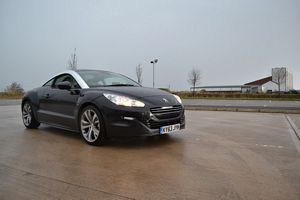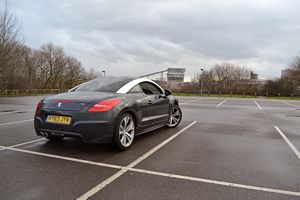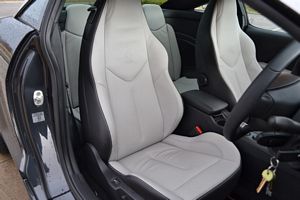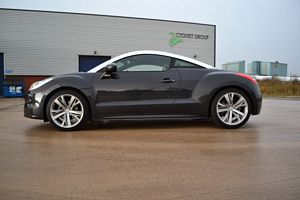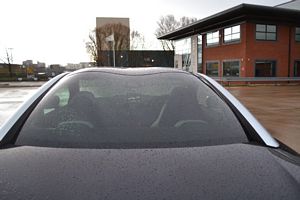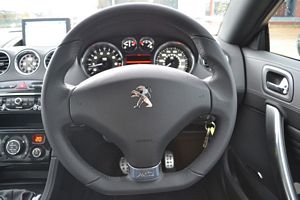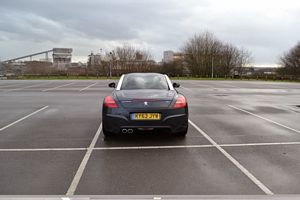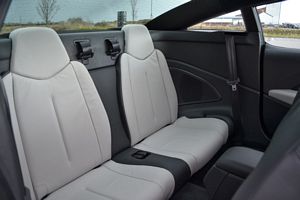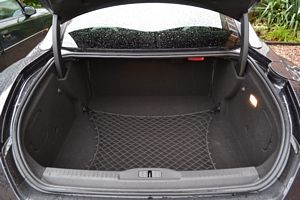|
By accessing or using The Crittenden Automotive Library™/CarsAndRacingStuff.com, you signify your agreement with the Terms of Use on our Legal Information page. Our Privacy Policy is also available there. |

2014 Peugeot RCZ GT THP 156 Review
|
|---|
|
|
2014 Peugeot RCZ GT THP 156 Review
Colin Hubbard
Speedmonkey
February 18, 2014
Colin Hubbard reviews the 2014 Peugeot RCZ
The Peugeot RCZ is a 2 plus 2 Coupe which was launched back in 2010 off the back of a concept car shown at the Frankfurt Motorshow in 2007. It is based on the mainstream 308 partly to save on production costs but also to speed up the gestation time and get it to market.
The RCZ is manufactured in Graz, Austria and being so close to Germany some of that Germanic build quality seems to have rubbed off as the fit and finish of materials is an age away from Peugeots of old. It is a particularly handsome car, much like the original Audi TT which coincidentally was also built off the back of a concept car.
The range consists of a 1.6 litre petrol engine in varying states of tune (156, 200 or 270bhp) and a 2 litre diesel with 163bhp. The car reviewed is the least powerful 156bhp petrol model in GT spec with a manual gearbox.
External impressions are that it is a great looking car that's still bordering on futuristic some 4 years after launch with clever styling touches finished off with seriously large 19 inch wheels. Curves are a common theme on the exterior of the car; appearing on the bubble style arches, along the outside edges of the bonnet and the gorgeous double bubble roof which apparently references the Peugeot racer's success at Le Mans.
The body shape is the polar opposite of an 80's Volvo, which were penned with only a steel ruler, whereas the RCZ looks to be have been penned part by bendy ruler and part by compass. The cab forwards stance reminds me of a Hennessey Venom with its elongated back end - this emphases the double bubble roof and fixed glass rear windscreen.
From some angles, especially the rear three quarter view, the body is quite feminine and from others like the side on and front three quarter view it's squat and aggressive. The bodyline rises just after the front door and into the shallow rear side windows and both are capped off with aluminium coloured roof 'arches' as Peugeot call them.
A pop up rear spoiler retains clean lines when parked up but adds a small amount of drama when it rises at 52mph, or it can be raised manually via a button in cabin.
The doors are very long and eat into the rear three quarter panels but, while aiding access to the rear seats, they make exiting tricky when parked close to other cars as their length means they can't open far in a tight spot.
Once in and it's a nice place to be. Peugeot have really pulled their socks up in the fit and finish department and leather covered and stitched dashboard and door cards bring an upmarket style to the cabin.
Luckily Peugeot haven't utilised their clocks above the steering wheel design which they use in the 208. This means you can have the steering wheel high enough to suit your driving position but unfortunately when in the optimum position it obscures the clocks so you can't see 100% of them. The steering wheel is completely button free with a lower pair of stalks to taking care of the stereo and cruise control functions.
The front seats are genuinely good looking with some thigh, hip and shoulder support and fixed headrest giving them an attractive shape and the light grey 'Lama' leather (from a moo'ing rather than spitting animal) seat faces contrast against the charcoal sides and backs. My personal view of grey leather is that it's dull and very 70s office furniture but its application in this cabin is one of style and flair. The Peugeot emblem embossed towards the top is a nice touch.
In the back and it's cramped - I wouldn't want to spend more than 15 minutes in there and even then my neck would be bent as the rear screen rakes rapidly toward the bootlid. Whilst in the back I noticed the shape of the headlining matches the outside contour of the double bubble roof. There’s more room than in a Mk1 TT and maybe slightly more than a Mk2 TT so perfect for the kids and for occasional emergency adult use hence the 2+2 tag.
The leather dash is well finished and the bumps over the 3 spheres (2 vents and an analogue clock) at the top of the dash are a nice design detail showing off some quality fabrication. Lower down on the centre console the heater and stereo functions are easily within reach and simple to operate.
Start the engine and a 7 inch info screen rotates out of top of the dash in the perfect viewing position just below the screen. It wasn't affected by sunlight on my test but can be adjusted if the need arises.
The 1.6 litre petrol is rated at 156bhp and 180 lb/ft torque - similar power to the old 306 GTI-6 but with a few more hundred kilos to carry. It is mated to a 6-speed manual gearbox with surprising long ratios with potential to manage a combined cycle 44mpg.
At start up and idle it's quiet and refined, but get going and it's slightly fruity, but all induction noise with sadly nothing coming from the two meaty tailpipes. Performance from this base car is, let's say, sufficient. It's not going to set your hair on fire by any means but it's more than enough to keep up with modern traffic. As with these small capacity turbocharged motors whilst there's reasonable low rev pull they have to be revved to extract the most speed and entertainment out of them. You need to get it over 4,000rpm to make good progress and use all of the throttle travel as there's a last inch if you press really hard and you feel it click like a switch. Keep your foot in and it gets more urgent towards it's 6,000rpm redline.
Performance figures are 0-60 in 8.3 seconds and a top speed of 133mph which is quicker accelerating but ultimately slower than the diesel model, presumable due to the diesel engine's extra weight. Over the course of a week it returned over 40mpg which is hugely respectable for a petrol car driven hard and only about 10mpg down on the diesel which costs £2k more so unless you do an exceptionally high mileage the petrol is the better bet.
The gearbox is a joy to use being slick in operation with a light clutch but I did take issue with the clutch pedal positioning. Every time I went for the clutch I would catch my foot on the pedal and the same coming off the clutch which is infuriating when on an enthusiastic drive. If it was my own car I would remove the clutch pedal and fabricate it half an inch to the right and half an inch lower, that's all it needs.
On a 200 mile motorway cruise it proved to be a friendly stead being a relaxed cruiser with little wind noise, a smooth ride and benefitting from high gearing of just 2,300rpm in 6th gear at 70mph. Whilst the engine may not be that powerful it pulls very cleanly from low revs. For example, in sixth gear at 50mph it pulls with no stutter or lag which would have other cars spluttering.
The electrics proved to be reliable and intuitive. The cruise control worked very well through variable speed limits on the M42 and showed your set speed on the dash. Speed can be fine-tuned through the left lower stalk. The auto wipers and auto lights proved to be user friendly over a week of monsoon weather and I didn't have to touch the wiper setting once.
The Sat Nav has good positioning and modern easy to read graphics but irritatingly will not accept postcode inputs so you have to find your destination with town, streetname and property number. This isn't really acceptable for a £700 option as I couldn't find my destination most of the time because Holly Cottage or Fairbank House aren't numeric and as I don't know the nearest house number it can't find the nearest street within the town. It's such a shame that this little bit of software deficiency lets down a great system as when you can find your destination it's better than a Tom Tom with a large main map and a little next junction map in the top of the screen.
The optional JBL hifi is a worthwhile option to pick. For just £420 you get six uprated speakers and a 240 watt digital amplifier. The sound is fairly bass heavy but also has clear vocals without being harsh.
My daily commute consists of 30 miles of mainly country roads which are in a poor state of repair and showed up a flaw in the wheel control of the car. The 19 inch wheels have mammoth 235/40/19 tyres and the suspension had a hard time of controlling the mass of the unsprung weight so the car would often be pushed off line with large crashes felt through the cabin over the potholes and ruts.
On smooth roads and all is good though with little body roll as the firm damping keeps a secure line and you can made steady progress if you avoid potholes. The brakes proved up to the task despite being a standard set up and I only once managed to trigger the ABS in the lovely but drenched Cheshire countryside.
When out in the rain and you look in the rear view mirror the water droplets emphasises the dramatic curves of the double bubble rear windscreen.
When you're in the mood it can be a entertaining drive. It has just enough power to tickle some wheel spin out of junctions. Keep the revs high to use all of the 156bhp and the chassis shines through a little of that French magic we were used to in the 80's - that’s if you can manage to avoid the British road defects. The little induction buzz helps you guess the revs so you can concentrate firmly on the road rather than the clocks and a little feedback through the wheel helps you position the car nicely on the road.
When pressing on I would appreciate a little more side support in the seats as whilst they look good they are built for comfort rather than cornering.
And now to the Achilles Heel - the price. The list price for this car is just over £24k and as tested with metallic paint, JBL hifi and Sat Nav it's a smidge over £26k so quite alot of money for a 1.6 Peugeot.
The only true competition on sale today is the Audi TT but how does that compare? The cheapest TT, the 1.8 TFSI, starts at £24k and once specced to the same standard as the RCZ as driven is over £31k, some £5k more expensive. The on-paper performance figures are fairly close, similar powered engines but the Audi is a little quicker as it weights over 100 kilos less.
There is no better car out of the two. It all boils down to personal preference. Both have stylish but cosy interiors and turn heads like a boxer's punch but the TT is slightly quicker, has a slightly better ride but then it costs £5,000 more than the RCZ. In the looks department I would say the French car is the better looker.
Just like a Mini the RCZ is available with all sorts of personalisation options - the body, arches, mirrors, roof and wheels are all available in a variety of colours and Peugeot also offer transfers for various body parts. The inside hasn't escaped the attention either with various 2-tone or single colour leather options.
Overall it's a very sleek and stylish car and now I've had one for a week I am noticing more and more of them on the road whereas prior to my drive I can only recall a handful. I was impressed with the interior build quality and whilst not quite of Germanic standard it has its own individual French flair.
As I write Peugeot has just launched the RCZ 'R' with a claimed 270bhp from the same 1.6 litre 4 pot, fitted it with a mechanical limited slip diff and some proper sports seats. After the 156 GT I can't wait to see how the RCZ has been transformed into a serious performance car.
Stats:
Price - £24,250 (£26,075 as tested)
Engine – 1.6 litre, 4 cylinder turbo, petrol
Transmission – 6 speed manual
0-62mph – 8.3 seconds
Top speed - 133 mph
Power - 156bhp at 5,800rpm
Torque - 180lb ft from 1,400rpm
Economy - 44.4mpg combined
CO2 - 149 g/km
Kerb weight – 1394kg unladen

















